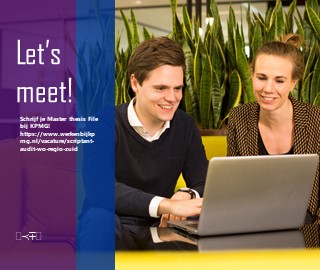Last month we had a conversation with Jordi Kerckhaert, former president of Asset-SBIT and now two years working at KPMG as an IT consultant, and Wout van Kessel, 14 years working at KPMG and now partner and also involved in the IT audit course at TIAS and Post-Master Accountancy at Tilburg University. In this interview, Jordi and Wout briefly talk about the work of an IT auditor, how IT auditing has developed over the years and how new innovations can bring about changes within the profession.
What does an average working week generally look like?
Jordi: That is a difficult question to answer. The advantage and the fun of working at KPMG is that you have several clients. To describe a working week is difficult to answer, because it depends very much on which different clients you are working with. We have a relatively busy period from September to about February. If I look at myself, I have done about two to three major clients, which means more than 250 to 300 hours of work. I also have a number of smaller clients. So it depends very much on which clients you work with.
With larger clients, you work in a number of waves, in which you have a piece of preparation such as planning and determining the scope. We often schedule a number of interviews with the customer and ask for proof in advance, which we then go through with the customer during the interviews. Depending on the outcome, some additional interviews may be scheduled. Throughout the process, you also ensure that your project management remains in order and that communication remains good. During an IT audit, it is also important to communicate well with our audit colleagues. During that process, you also ensure that everything is properly documented. When I have an interview week, I spend a lot of time with the same client, at an intensive level with a lot of interaction, but you don’t have that every week.
If I rewind for a moment, I worked at home for a client on Monday, for example. On Tuesday, I went to Rotterdam for a whole day to a client where I was doing a consultancy job. On a day like that, I have a lot of meetings with various stakeholders and work on a few things in between. On Wednesday, I was back at the office in Eindhoven where I had planned a focus block for myself for a smaller assignment. I also planned a feedback meeting with a colleague, where you give each other feedback on how we have performed in the past year, and whether there are any tips and tops. On Thursday, we had another kick-off for a new client in the morning, and on Friday I’m still at TIAS where I’m following the post-master IT auditing
Can you explain what IT auditing in general entails?
Jordi: ‘Traditional’ accountants audit the annual accounts. In the past, the audits were based on paper and archive folders. Over the years, these audits have increasingly involved various applications and systems that have an impact on the financial statements. This is what eventually led to our profession. In a way, we have to ensure that our auditor colleagues can rely on the systems from which they get the financial data for their audits.
Wout: So we provide assurance about the effective and reliable functioning of IT systems and processes. In addition, we can also offer clients advice on IT systems and everything around them.
“The hard IT payment system is not much different, only the shell around it has changed substantially”.
How does an audit in the present differ most from an audit 10 years ago?
Wout: There is a small comment to be made here, because the answer differs per segment. If you look at the financial sector, for example, the hard IT payment system has not changed substantially; it still runs on mainframes or older IT environments. However, the shell around it has changed substantially; for example, if you look at larger organisations such as multinationals, you will see that they have centralized their IT infrastructure. As an auditor, you can follow such a development of an organisation. This means that you cannot perform a centralized audit when a client is only organised at a local level.
However, this development has transformed the audits. Due to centralization and availability of IT resources, we have started to audit much more digitally. 10 years ago, which may have been slightly distorted, because in Eindhoven were already very advanced in data analysis at the time, for example we were able to centrally audit the processes at Philips and DSM,. This gave us insight into the global procurement process; the order was digital, the goods receipt was digital, and so were the invoices. This allowed us to test the entire process integrally. This means that by means of data analysis, you can provide a reasonable degree of certainty about the process, but we can also check the entire process. So, for example, we can inform a component auditor in the Philippines that 300 invoices were not processed in accordance with the standard process.
So with the advent of data analysis, process mining, and actually new audit techniques, you can give a much higher measure of certainty on large populations. 100% will never work, no accountant would dare to sign off on that. However, this will bring you very close to that point.
Do you expect that this development and transformation of the profession will only accelerate if we take into account new innovations such as Artificial Intelligence and Deep Learning?
Wout: That could certainly play a role, although I have to say that many customers are not concerned with this in their financial administration. If you see how RPA is used, it is often in relation to purchase invoices. In fact, that entails an application control on an automated event. You then check the robot and everything around it, which is not very innovative for how you are going to design your audit.
The moment the customer starts using Artificial Intelligence in the financial administration and starts taking decisions based on that, that’s when things become different. Then you find yourself in a discipline where you have to ask yourself: how can you be sure that the algorithm works correctly and makes the right choices? That creates interesting questions, especially if you look at self-learning algorithms; what impact does it have on the annual accounts audit? Conceptual frameworks for this are also being developed together with universities in order to find out what these developments mean for professional technology, among other things.
However, what you still see in many professional technology and auditing protocols is that protocols do not yet allow the use of data analysis or other means. An example is the protocol of the Ministry of Education; all data relating to your study career are stored digitally in Studielink. Because everything is digital, you can map and test the entire flow of how someone goes through his education by means of data analysis. Then the control protocol of the ministry literally says: do a random check of 25 people who have graduated and establish that there is a diploma. That is a great shame and a missed opportunity, since you have everything digitally and still have to do a random check, instead of taking the entire population with data analysis. In this respect, you can see that the technical aspects and guidelines lag behind what is actually possible, which also partially blocks innovation.
Jordi: But innovations that do take place make the work even more efficient. If you look at the past 10 years, our work has become increasingly risk-based. Ultimately, of course, we would like to ensure that we no longer have to carry out random checks on any customers. Whether that will be achieved remains to be seen, but it is a nice goal to strive for.
“In terms of soft skills, I have learn a lot from Asset.”
Aren’t accountants then at risk of becoming unemployed?
Wout: Several studies have already been done on this, looking at professions that can be automated first. The accountant comes very close to this. 80 to 90% of the time in an annual account is now spent on routine validation, where little value is added and only boxes are ticked. So you could automate all this. Where the time of accountants should go then are precisely the ‘judgemental’ items, or estimation items about which you need to have an understanding discussion with the client. You cannot teach an algorithm to do that. It is precisely in the area of estimation items that the greatest risks for an annual account audit lie, which means that you want to focus your time on them as efficiently as possible. It is therefore not easy to say that accountants will become unemployed, but the expectation is that the work, and the time spent on it, will change substantially for accountants.
What skills have you brought with you from asset management that you can now apply in your work?
Jordi: In terms of soft skills, I have learn a lot from Asset. As chairman, you have to deal a lot with project management and, of course, plans. You make lists of tasks and ask yourself: what is important at the moment? What tasks can I outsource or do later? Holding discussions is also something I definitely learned at Asset; for example, we were given the task of developing and setting up a new website and administration system for Asset and its departments. In order to achieve this, we held discussions with various suppliers to outsource the development and implementation. Such discussions are partly comparable to sitting down with a customer with whom you have never spoken, especially in the area of soft skills.
Finally, we asked ourselves, what would you like to give current students?
Jordi: Start your orientation in time to see what you really want to do and what gives you energy. It is very difficult to make the right choice right away. What has helped me a lot is to attend many career events during my bachelor and master period. In this way, you can also determine what you do not like so that you can eventually choose a number of interesting organisations. Based on that, you can then make an appointment to visit an organisation to get to know each other better.
Wout: “If you are blindly aiming for a quick career, you will be unhappy everywhere. So you should indeed look for work that you like and that gives you energy; if something gives you energy, in that sense you are intrinsically motivated to take that extra step, and in that way career comes naturally.

















